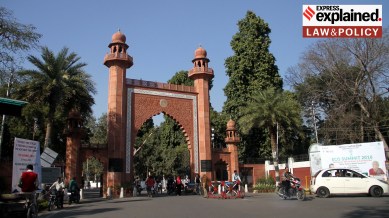Aligarh Muslim University minority status case: 3 key legal issues argued before the Supreme Court
The Supreme Court will decide if Aligarh Muslim University can be recognised as a minority educational institution. Here are three key arguments made before it.

The Supreme Court Thursday (February 1) concluded the hearings in the case to decide if Aligarh Muslim University (AMU) can claim minority status under Article 30 of the Constitution.
The seven-judge bench will also decide if the decision in S Azeez Basha v Union of India (1967), where the court held that AMU was not a minority institution, should be overruled.
monthly limit of free stories.
with an Express account.
The bench led by Chief Justice of India DY Chandrachud heard arguments for eight full days between January 10 and February 1 this year, before reserving the judgement in the case.
Here are 3 key arguements made before the court,
What is the effect of a statute on minority status?
Background: Article 30(1) of the Constitution of India states “All minorities, whether based on religion or language, shall have the right to establish and administer educational institutions of their choice.”
In 1967, in S Azeez Basha v Union of India, the Supreme Court held that AMU was “established” through the enactment of a law, the Aligarh Muslim University Act, 1920. This meant, according to the court, that AMU does not qualify for minority status as it was not established by the Muslim community.
Petitioners: Senior Advocate Rajeev Dhavan argued that there is a contradiction in the Azeez Basha decision, in which the apex court had held that in order for degrees from the university to be valid, the university would have to be recognised by a statute (such as the AMU Act). However, the court also held that recognition by a statute would strip AMU of its minority status.
This would, Dhavan argued, force every minority institution to seek recognition under a statute, and give up its minority status, thus making Article 30 ineffective, and subordinating a fundamental right to a statute.
Respondents: Solicitor General Tushar Mehta argued that AMU surrendered its minority status to the British government, and chose to be a “loyalist” institution, as opposed to “nationalist” institutions (like Jamia Millia Islamia University), which resisted and denounced the British government. This surrender of rights, he said, was recognised in Azeez Basha.
How does the administration of AMU impact its minority status?
Petitioners: Senior Advocate Kapil Sibal argued that it does not matter who is in charge of administration in a minority institution, even if the members of the administration are not members of the minority community. Article 30(1) gives minorities the right to choose who is in charge of administration without, affecting the minority status of the institution in question.
Respondents: The administration must be considered in this case as the British government had ultimate control of the university through the Lord Rector, when AMU was first established. Though the Court of the University handled the day-to-day administration, the decisions of this Court were subject to the approval of the Lord Rector under the AMU Act, who was a representative of the British government.
Should the 1981 amendment be considered in this case?
Background: The 1981 amendment to the AMU Act introduced multiple provisions stating that the university was established by the Muslim community, and explicitly highlighting the need to promote the cultural and educational advancement of Muslims in India.
This amendment was struck down by the Allahabad HC in 2005 which held that AMU was not a minority institution as per Azeez Basha. They also held that the 1981 amendment was enacted in order to override the Azeez Basha decision. This ruling was challenged at the SC, and was referred to a larger bench by a two-judge bench in 2006.
Petitioners: Sibal argued that there is no requirement to examine the validity of the 1981 amendment and the Allahabad HC decision. If Azeez Basha is struck down then the 1981 amendment becomes “redundant” as AMU’s minority status would be recognised. If Azeez Basha is upheld, then the amendment will be considered along with the Allahabad HC decision by a smaller bench.
Further, advocate Shadan Farasat argued that the 1981 amendment cannot be considered in this hearing as, without the Union of India defending it, there is no one presenting a defence on behalf of Parliament in Court. He also urged the court to decide if the Union has the option to not defend the amendment, despite being constitutionally obligated to do so.
Respondents: Mehta argued that the seven-judge bench should be considered in this case to avoid multiple hearings on the same subject. He also stated that the petitioners see the 1981 amendment as a “second chance” to make a case for AMU’s minority status, if Azeez Basha is upheld.
This led to an exchange between CJI Chandrachud and Mehta where the Chief Justice questioned how the government could choose not to support an amendment enacted by Parliament. Mehta replied stating that the Allahabad HC decision gave the central government ground to stand on to make this argument, and further stated that it was his constitutional duty to answer a constitutional question correctly.
Senior Advocate Neeraj Kishan Kaul later argued that Parliament tried to use the 1981 amendment to override the court’s findings in Azeez Basha which is impermissible, according to previous SC judgements.